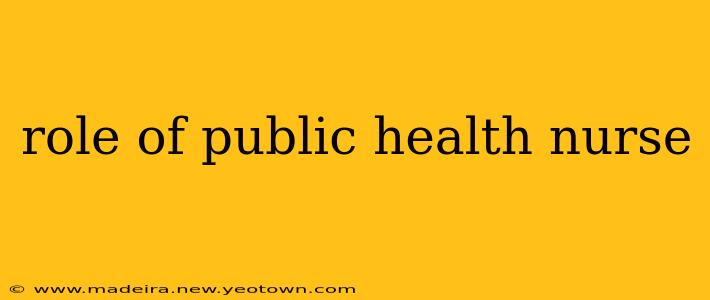The Unsung Heroes of Healthcare: Exploring the Crucial Role of a Public Health Nurse
The air hung heavy with the scent of antiseptic and anxiety. Inside the bustling community clinic, Sarah, a seasoned public health nurse (PHN), moved with a practiced grace. It wasn't the sterile environment of a hospital, but a vibrant tapestry of lives interwoven with challenges and triumphs, all under the watchful eye of public health. Sarah's day, like that of every PHN, was a testament to the multifaceted and critical role they play in safeguarding community well-being.
It's easy to think of nurses as solely hospital-bound, tending to patients in individual beds. But the public health nurse is a different breed, a community advocate, disease detective, educator, and champion of preventative care, all rolled into one. Their work extends far beyond the four walls of a clinic, reaching into the heart of the community to address the root causes of illness and promote holistic health.
What exactly does a public health nurse do?
This is a question often asked, and the answer is far-reaching. PHNs are the frontline defenders against disease outbreaks, health disparities, and the broader social determinants of health. Their responsibilities are diverse and demanding, often involving:
-
Disease Surveillance and Prevention: Think of them as the community's detectives, tirelessly tracking outbreaks, identifying at-risk populations, and implementing interventions to prevent the spread of infectious diseases. From influenza to measles, they are crucial in containing epidemics before they escalate.
-
Health Education and Promotion: Sarah spent a significant portion of her morning leading a workshop on diabetes prevention for a group of senior citizens. PHNs empower communities with knowledge, teaching healthy lifestyle choices, promoting vaccinations, and providing crucial information about chronic disease management. Their role is pivotal in changing behaviours and improving health outcomes.
-
Health Assessments and Screenings: Regular check-ups are a cornerstone of preventative care, and PHNs are instrumental in providing these vital services, often in underserved communities where access to healthcare is limited. Blood pressure checks, immunizations, and screenings for various diseases are all part of their repertoire.
-
Case Management and Home Visits: Sometimes, the best care happens in the comfort of one's own home. PHNs make home visits to provide individualised care, monitor patients' conditions, and ensure they have access to the resources they need. This could range from wound care to mental health support.
What are the challenges faced by public health nurses?
The work isn't always easy. PHNs face significant challenges, often juggling multiple responsibilities with limited resources. These challenges include:
-
Limited Resources: Funding constraints can impact the scope and effectiveness of public health programs. This translates to fewer staff, less equipment, and limited access to essential resources.
-
High Caseloads: A single PHN can be responsible for a large population, leading to intense workloads and the need to prioritize cases effectively.
-
Addressing Social Determinants of Health: Many health problems stem from social factors like poverty, lack of access to healthy food, and inadequate housing. PHNs are often on the frontlines of battling these complex issues, requiring creative solutions and collaboration with other organizations.
-
Burnout: The demanding nature of the work and the emotional toll of dealing with vulnerable populations can lead to burnout among PHNs. Support systems and adequate staffing levels are critical to mitigating this issue.
What education and skills are required to become a public health nurse?
To become a public health nurse requires a blend of education, skills, and a deep commitment to community well-being. Typically, this includes:
-
Bachelor of Science in Nursing (BSN): A BSN is the foundation for nursing practice, providing a comprehensive understanding of nursing science and practice.
-
Master of Public Health (MPH) or related advanced degree: Many public health nurses pursue an MPH to gain specialized knowledge in public health principles, epidemiology, and community health interventions.
-
Strong communication and interpersonal skills: PHNs interact with diverse populations, requiring exceptional communication, empathy, and cultural sensitivity.
-
Critical thinking and problem-solving abilities: Analyzing data, identifying trends, and developing effective interventions require strong analytical skills.
How is technology impacting the role of a public health nurse?
The digital age is transforming public health nursing. Technology is enhancing various aspects of their work:
-
Electronic Health Records (EHRs): EHRs facilitate efficient data management, improving tracking of patient information and disease surveillance.
-
Telehealth: Telehealth enables remote consultations and monitoring, extending the reach of PHNs to underserved areas and improving access to care.
-
Data Analytics: The use of big data analytics allows PHNs to identify patterns, predict outbreaks, and tailor interventions more effectively.
In conclusion, the role of a public health nurse is far more than just administering shots or taking vital signs. They are vital community pillars, silently working behind the scenes to protect and improve the health of populations. Their work, often unseen, is undeniably heroic, quietly shaping a healthier future for all.

